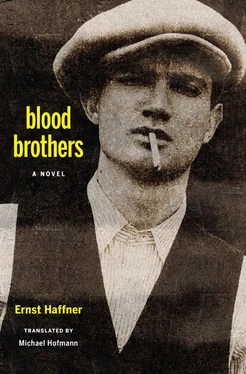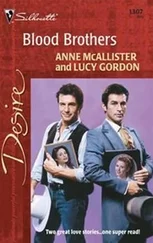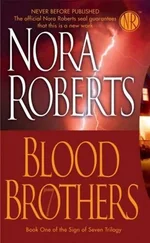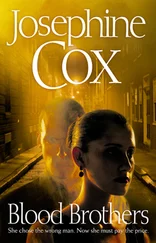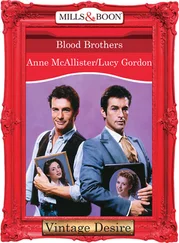For a moment, neither of them speaks. All around them, the noise of the overfilled refreshment room. Busy people sitting over a drink. With the rim of the cup against their lip, they suddenly remember: Oh yes, I wanted popper buttons. Or: August wanted to try some of those jellied prawns! The cup clinks down on its saucer, and the person rushes over to the elevator. But there are also people here with too much time on their hands. Time is the only thing they have. There are no anxious waiters hovering here; here, when home is a cold and unlit hole, you can sit for six or eight hours over a cheap coffee.
“Hey, Willi,” Ludwig breaks the silence a little unwillingly, “you know something we could try? I’ve talked to some guys who’ve done it, and done all right with it.” “Well, what, what is it?” “Listen, Willi. We take a sack. A sack each — one for you, one for me. Then we go from house to house and we say: Hello, good morning, we pay top whack for old boots and shoes, as much as two marks a pair. Do you have any to sell? And then, when they show us their stuff, we make a face, and keep making a face, and in the end we just pay ten or twenty pfennigs apiece. When our sacks are full, we take all the shoes and boots, and polish them and shine them up. We could even get some cheap pieces of leather, and straighten a heel, or put a patch on a sole. Then when everything’s hunky-dory, we sell the whole lot to junk dealers!” Ludwig stops and looks expectantly into Willi’s face. “Well, go on, what do you think?” “Do you think we’ll manage to flog that old junk?” “Flog it?” crows Ludwig, “Do you think some unemployed geezer can afford top of the line shoes at Salamander? Our old junk will be the best stuff going!” “But where will we get hold of a place to kip and work on these shoes?” asks Willi. “Yeah, I know, a place. Without papers. I’ve got papers in the name of Kaiweit of course, but I can’t let the police see those …” says Ludwig.
For the past six months, the pensioner Frieda Bauerbach has had a sign out: Room to let to 1 or 2 gentlemen. See Bauerbach. Yard, 1. Cellar, left. “Shall we give it a go, Willi?” “No harm in trying.” No sunbeam has ever succeeded in illuminating the depths of widow Bauerbach’s basement bedsit, and daylight can only be induced to produce a blue shimmer in the cellar by means of an ingenious arrangement of mirrors. A friendly lady of sixty-odd opens to their knocking. Come about the room? “Yes, for me and my brother,” replies Ludwig.
The back room is spacious and has a large window. What it looks onto: a sprawling heap of junk. Inventory of the room: two iron bedsteads, a table, a wardrobe, three chairs and a washstand. In the darkest corner lurks a hideous plush sofa. Rent, for two occupants: ten marks per week, including coffee, excluding rolls, heat and gas. The “brothers” Ludwig and Willi eye one another questioningly. “We’ll take it,” says Ludwig. “Our name’s Kaiweit. He’s Willi and I’m Ludwig. We’ll register with the police tomorrow. And now listen, madam. We’re in business. We buy old shoes and resell them. And we mean to bring all the shoes we buy, a sack of them a day, back here and clean them up. Is that all right with you?” Frau Bauerbach is agreed. She offers up a still darker kitchen space. The shoes could be cleaned and stored there. “Business is business. Main thing is, it’s an honest business,” says Frau Bauerbach with preacherly dignity. “Here’s the first week’s rent in advance, and we’ll bring in our things later.” They are given a set of keys, and Frau Bauerbach goes out with a chair, to at last take down her sign.
“Now let’s get going, Willi!” They make for the shops. First sacks; they’re only thirty pfennigs. Then big pots of shoe-polish, and an array of brushes and laces. A few pounds of scrap leather, an iron tripod, various nails and hammers and pliers, things a cobbler might need. For their own needs, some cheap linen, toiletries, and some food items so that they only need to eat out once a day. Everything is stowed in two large cardboard boxes. Then they go back home. Home … how that sounds … Home is Ziethenstrasse in Neukölln.
In the meantime, Frau Bauerbach has made their room a little more comfortable. The sofa’s arms and back are resplendent under white crocheted throws, there are patchwork rugs next to their beds, and everywhere freshly dusted kickshaws catch the eye. Frau Bauerbach has even gone to the trouble of getting a new mantle for the gaslight. And if the gentlemen — “Hear that, Willi, gentlemen!?” — have any wishes, a cup of coffee or tea, then Frau Bauerbach will be only too glad to oblige. Happy, with flaming cheeks, the boys stand in their room: yes, indeed, their room! Not in a welfare dorm, not in a hostel, no: furnished gentlemen, in their own room! They unpack their purchases, carry the tools and the leather into the little cubbyhole that will be their workshop. Here, too, Frau Bauerbach has donated a mantle to the rusty old gaslight. Willi goes out for wood and coke briquettes, and before long the Dutch oven is radiating heat.
The lamp is lit, the table pushed up to the sofa, and Frau Bauerbach brings them coffee for their supper, as requested. In a mighty brown pot, there it is, steaming on the table. Frau Bauerbach has supplied them with cups and cutlery too. And here comes the solemn moment when Willi and Ludwig settle down on the sofa to begin supper. Not a dry roll and beer, like in the bar. No, a real homely supper. They look at each other but don’t speak. The moment is too much. They have their own place, after all that dirt, after so much doing without … After supper they each settle into their corner of the sofa, smoking and thinking about tomorrow’s tour. Their debut as boot-buyers. Frau Bauerbach comes in one last time, and brings an alarm clock. They set it for eight o’clock, and then they go to sleep.
At nine the next morning, they pick up their rolled-up sacks, jam them under their arms and get small change for ten marks from the post office. As a man of business, you always have to have the correct change, the clientele wants to be paid quickly and promptly. Streets left of Berliner Strasse have been set as the field of operations. On the way there, they practice their line: “Good morning. We’re paying up to two marks for old shoes — have you got any you’re looking to sell?”
Isn’t this a good omen? From the first — the very first — woman they acquire two pairs of gents’ shoes, brown and black. After a bit of back and forth, Ludwig shells out sixty pfennigs. Into the sack they go. Here the door isn’t even opened, they see the suspicious eyes at the peephole. In another place, the whole family is employed to scout around corners and look out for old shoes. Payment is in cash, and cash money in proletarian Neukölln is a rare commodity. At the end of two hours they have paid out two marks eighty and have acquired nine pairs of shoes. They go remorselessly up stairs and down: “Good morning, We’re paying …” We’re paying, those are the magic words. By two o’clock both their sacks are full. The boys have lost count of how many pairs. They’ve paid out around eight marks.
Home, to Mother Bauerbach’s. Dump the sacks in the workshop, quickly grab some lunch, and then get to sorting and repairing and cleaning. They gulp down their fifty pfennigs’ worth of lunch, smoke a cigarette on the way home. They tie on aprons made of old sacking, and then it’s to the workshop. The shoes tumble out of the sacks onto the floor. Each pair was laced together upon acquisition. First, those pairs needing repair are sorted out. Ludwig gets out nails and tools, and sets to work. A patch on a heel here, another on a toecap there. Willi gets to brushing and polishing. They work without looking up, hardly talking. Every so often, a puff at a cigarette. By eight at night, twenty-two pairs of shoes and seven pairs of boots are standing in a row. Clean, shining, fixed up. Ludwig and Willi inspect their troops, and each pair is given a number that is entered on a list, together with the price it is expected to bring from the junk man. According to the list, the total for twenty-nine pairs will be twenty-one marks and forty pfennigs. A clear profit of thirteen marks. “Well, let’s see if we get that much,” says Willi laconically. For tomorrow, only three hours of acquisitions are planned. In the afternoon, they need to dispose of the twenty-nine pairs. To dealers on Linienstrasse, Grosse Hamburger Strasse, Ackerstrasse and Auguststrasse. They will have to keep their eyes peeled for any Brothers. After supper, they crawl into bed, exhausted.
Читать дальше
